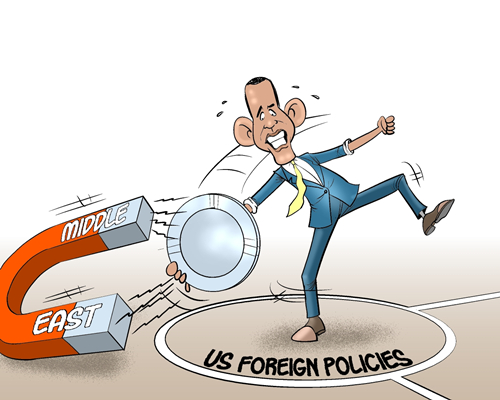The end of the unipolar US system in the Middle East
- By Jin Liangxiang
 0 Comment(s)
0 Comment(s) Print
Print E-mail China.org.cn, October 31, 2014
E-mail China.org.cn, October 31, 2014
Every time the Middle East has a new problem, analysts and media ask the same question: whether the United States will send troops to intervene, and the people in Washington's policymaking circles will then ask other countries to send troops together with the United States.
|
|
|
Irresistible [By Jiao Haiyang/China.org.cn] |
This has actually become the mentality for more than two decades. They asked the same question respectively when Gaddafi was pressing domestic opposition, when Syria's domestic conflicts intensified, when they were concerned about the Iran nuclear issue and when ISIS rose to challenge the regional order.
It is true that the United States did play a constructive role in the Middle East for some time, but great changes have taken place in the region since the new century. In particular, the last decade witnessed the end of America's unipolar system in the Middle East. To deal with problems in the Middle East today, we need go beyond such a mentality.
The unipolar U.S. system in the Middle East is the product of three factors: the ending of the Cold War bipolar system, the super power the United States had and the right policy that the U.S. adopted in the 1990s. While the end of the Cold War paved the way for the United States to grow into a dominant power in the region, the superpower laid a solid foundation for its predominant role, and its right policy served to help the United States establish its status of the single dominant power of the region and its prestige as well. The last is crucial in particular.
In 1991, the United States, leading a coalition of multiple forces, drove Saddam Hussein's forces back to Iraq. This behavior was welcomed by the world since it maintained the rules of international relations and restored the order of the region. The United States also took tremendous efforts to push forward the peace process between Israel and Arab countries. Despite the final stagnation of the peace process, America's efforts are appreciated. The United States had also maintained stability in the Gulf region with dual containments, and in Syria and Lebanon with the recognition of Pax-Syriana.






